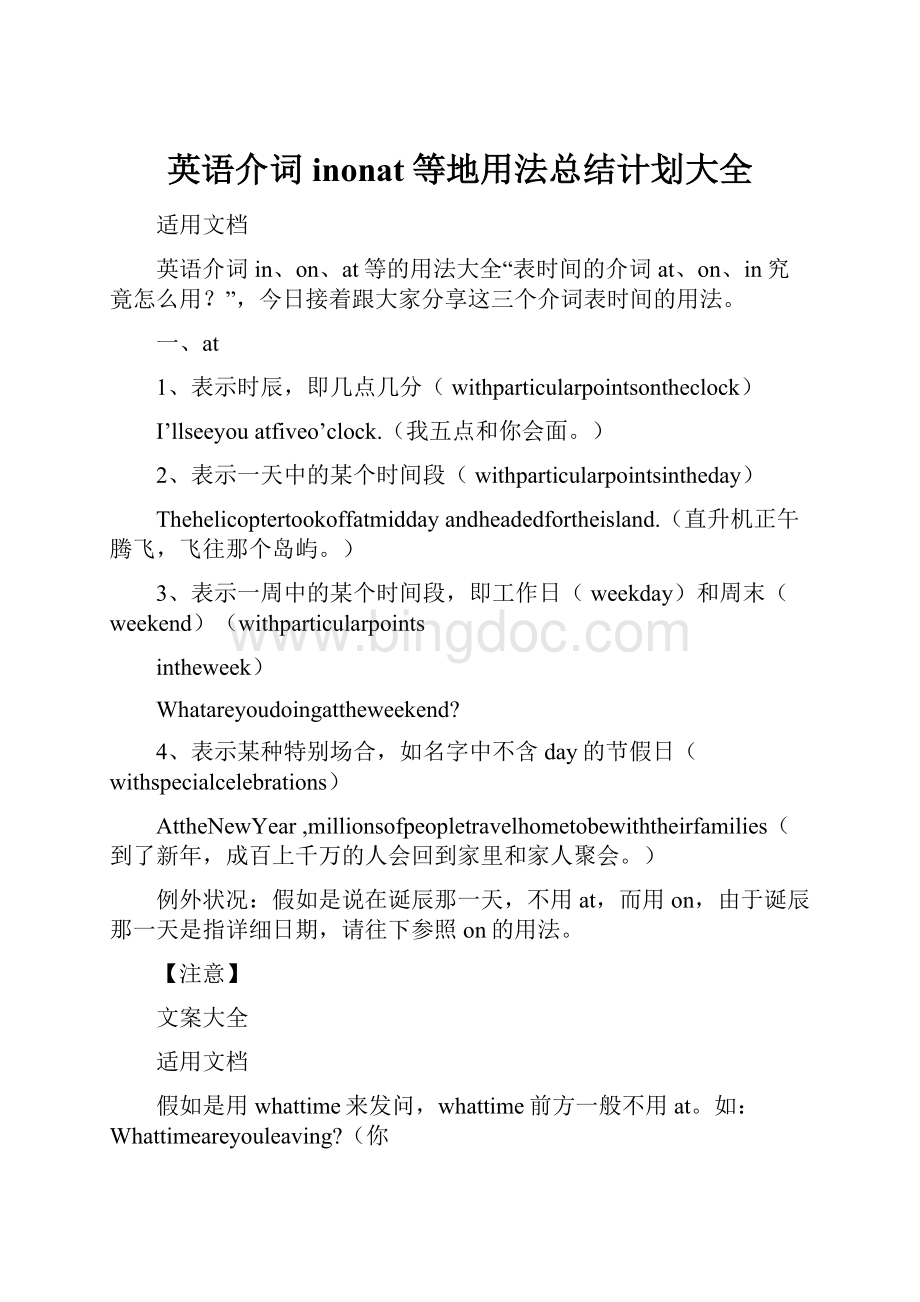英语介词inonat等地用法总结计划大全.docx
《英语介词inonat等地用法总结计划大全.docx》由会员分享,可在线阅读,更多相关《英语介词inonat等地用法总结计划大全.docx(11页珍藏版)》请在冰点文库上搜索。

英语介词inonat等地用法总结计划大全
适用文档
英语介词in、on、at等的用法大全“表时间的介词at、on、in究竟怎么用?
”,今日接着跟大家分享这三个介词表时间的用法。
一、at
1、表示时辰,即几点几分(withparticularpointsontheclock)
I’llseeyouatfiveo’clock.(我五点和你会面。
)
2、表示一天中的某个时间段(withparticularpointsintheday)
Thehelicoptertookoffatmiddayandheadedfortheisland.(直升机正午腾飞,飞往那个岛屿。
)
3、表示一周中的某个时间段,即工作日(weekday)和周末(weekend)(withparticularpoints
intheweek)
Whatareyoudoingattheweekend?
4、表示某种特别场合,如名字中不含day的节假日(withspecialcelebrations)
AttheNewYear,millionsofpeopletravelhometobewiththeirfamilies(到了新年,成百上千万的人会回到家里和家人聚会。
)
例外状况:
假如是说在诞辰那一天,不用at,而用on,由于诞辰那一天是指详细日期,请往下参照on的用法。
【注意】
文案大全
适用文档
假如是用whattime来发问,whattime前方一般不用at。
如:
Whattimeareyouleaving?
(你
几点走?
)可是在口语中也能够这么问:
Atwhattimeareyouleaving?
二、on
1、用在日期前(withdates)
Wemovedintothishouseon2October1997.(我们是1997年10月2日搬进这栋房屋的。
)
2、用在礼拜的单数前(withasingulardayoftheweektorefertooneoccasion)
I’vegottogotoLondononFriday.(我周五就到伦敦了。
)
3、用在礼拜的复数前(withapluraldayoftheweektorefertorepeatedevents)
TheofficeisclosedonFridays.(办公室周五是关门的。
)
特别状况:
口语中有时会省略on,如:
DoyouworkSaturdays?
(你周六上班的吗?
)
4、用在特别日子前(withspecialdates)
Whatdoyounormallydoonyourbirthday?
(你诞辰那一天一般都做些什么?
)三、in
1、用在一天中的某个时间段前,一般为固定用法(withpartsoftheday)
I’llcomeandseeyouinthemorningforacupofcoffee.(我上午来看你,一同喝杯咖啡。
)
文案大全
适用文档
2、用在月份前(withmonths)
WeusuallygocampinginJulyorAugust.(我们常在7月或8月份去露营。
)
3、用在年份前(withyears)
Thehousewasbuiltin1835.(这座房屋是1835年造好的。
)
4、用在季节前(withseasons)
Thegardeniswonderfulinthespringwhenalltheflowerscomeout.(春季里,当所有的花儿都开放时,花园很漂亮。
)
5、用在较长的时间段前(withlongperiodsoftime)
ThepopulationofEuropedoubledinthenineteenthcentury.(十九世纪期间,欧洲人口翻了一倍。
)
6、用在一段时间前方(tosayhowlongittakessomeonetodosomething)
Hewassuchaclevermusician.Hecouldlearnasonginaboutfiveminutes.(他是个很聪
明的音乐家,他能够在约5分钟内学会一首歌。
)
7、用在“in+一段时间+'s+time”构造中,表示未来时间,如inayear’stime和intwomonths’
time(with-'sconstructiontosaywhensomethingwillhappen)
Iwon’tsaygoodbyebecausewe’llbeseeingeachotheragaininthreedays’time.(我不跟你辞别了,由于三天后我们就会再会面的。
)
【注意】上边这句话中的inthreedays'time也能够用inthreedays。
注意对照下边这个句子:
文案大全
适用文档
Heranthemarathoninsixhoursand20minutes.(他在马拉松竞赛顶用时6个小时20分钟。
)四、特别状况
1、atoron?
当抽象指代假期或周末时,用at;当特指某个详细的假期或周末时,用on。
如:
WenevergoawayattheNewYearbecausethetrafficisawful.(新年我们从不出门,由于路上太堵了。
)
OnNewYear’sDay,thewholefamilygetstogether.(在元旦那一天,整个家人会聚会在一同。
)
I’llgoandseemymotherattheweekendiftheweather’sokay.(周末假如天气好,我会去探望我母亲。
)
ThefolkfestivalisalwaysheldonthelastweekendinJuly.(这个民间节日老是在7月的最后一个周末举行。
)
注意:
美语里用的更多的是:
ontheweekend。
2、inoron?
当要表示抽象表示一天中的时间段morning、afternoon、evening和night时,一般用in,并且
后边要加定冠词the;当表示详细某个时间段时,要用on。
如:
Ialwaysworkbestinthemorning.Ioftengettiredintheafternoon.(我上午的工作效率总是最好的,下午常常感觉疲备。
)
文案大全
适用文档
TheshiplefttheharbouronthemorningoftheninthofNovember.(轮船在11月9日的清晨走开了港口。
)
Intheeveningtheyusedtositoutsideandwatchthesungoingdown.(他们过去常常在傍晚坐在外面看日落。
)
Ithappenedonabeautifulsummer’sevening.(这件事情发生在一个漂亮的夏季夜晚时分。
)【注意】
对于night,假如是抽象地讲,就用atnight,中间不插入任何成分;假如是特指某个夜晚,一般用
inthenight。
如:
Iwasawakeinthenight,thinkingaboutallthethingsthathavehappened.(夜里我醒了过来,向来想着发生的事情。
)
‘It’snotsafetotravelatnight,’theofficersaid.(警官说道:
“夜里出行不安全。
”)
3、attheendorintheend?
attheend后边一般要接of,表示“在...末”;intheend一般作为固定短语,后边不再接成分,
表示“最后”。
如:
Attheendofthefilm,everyonewascrying.(电影快结束时,每一个人都在哭。
)
Ilookedeverywhereforthebookbutcouldn’tfindit,sointheendIboughtanewcopy.(我各处找书,但仍是找不到,因此最后就买了本新的了。
)
4、atthebeginningorinthebeginning?
与end的用法相像,atthebeginning后边一般要接of,表示“在...开始”;inthebeginning一般作为固定短语,后边不再接成分,表示“刚开始”。
如:
文案大全
适用文档
Atthebeginningofeverylesson,theteachertoldthechildrenalittlestory.(每节课一开始,老师都会给孩子们讲个小故事。
)
Inthebeginning,nobodyunderstoodwhatwashappening,butaftersheexplainedeverythingverycarefully,thingsweremuchclearer.(一开始,大家都不知道发生了什么事情,可是经过她认真解说以后,全部都理解了。
)
5、不用at、on、in的状况
假如时间前方有each、every,next、last、some、this、that、one、any和all等词时,就不用表时间的介词了。
如:
HeplaysfootballeverySaturday.(他每周六都踢足球。
)
Areyoufreeattwoo’clocknextMonday?
(你下周二两点有空吗?
)
LastsummerwerentedavillainPortugal.(昨年夏季,我们在葡萄牙租了一栋别墅。
)表地址的介词at、on、in究竟怎么用?
一、at
1、用在表示地区面积不大的某个点的地方(如饭桌旁、电影院、车站、机场等)前(torefertoa
positionorlocationwhichweseeasapoint)
Iwassittingatmydesk.(当时我正坐在课桌旁。
)
文案大全
适用文档
2、用在企业名称(重视表达的是工作的单位,而不是工作地址)前(totalkaboutlocationsat
companies,workplaceswhenweseethemasaplaceofactivity)
HowmanypeopleareworkingatMicrosoft?
(有多人在微软工作?
)
3、用在好多人参加的活动场合前(torefertoactivitieswhichinvolveagroupofpeople)
WereyouatLisa’sparty/thecinema/thetheatre?
(你当时在丽莎的聚会上/电影院里/剧院里
吗?
)
4、用在学校前(withschool/college/university)
Shealwaysdidwellatschool.(她在学校表现向来很好。
)
5、用在详细地址、某人家里前(torefertoanaddressorsomeone'shouse)
Theyoncelivedatnumber12SouthGeorge’sStreet.(他们以前住在南乔治街
12号。
)
6、用在公共服务场所(totalkaboutpublicplaceswherewegettreatments,suchasa
hairdresser’sordoctor’ssurgery)
Ican’tmeetatfour.I’llbeatthehairdresser’suntilfive.(四点我没法跟你会面。
我在美发
店要呆到五点。
)
7、用在大多数商铺前(torefertomostshops)
LookwhatIboughtatthebutcher’stoday.(看看我今日在肉店都买了些什么。
)
8、用在旅途中经过的地址前(torefertoaplacewhichisapartofourjourney)
Westoppedataverynicevillage.(我们路过一个很漂亮的乡村。
)
文案大全
适用文档
9、用在不含day的节假日前(torefertoaholidaywithout“day”initsname)
PeoplewillalwaysenjoyabigdinneratChristmas.(人们在圣诞节总会享受一顿大餐。
)【特别用法】
athome-atwork-attheseaside-atsea(onavoyage)-atreception-atthecornerofa
street-attheback/frontofabuilding/groupofpeople,etc.-arriveatsmallplacesor
someevents
二、on
1、用在任何物体或地址的表眼前(torefertoapositiononanysurface)
IknowIleftmywalletonthetable.(我知道我把钱包落在桌子上了。
)
2、用在道路和河海湖前(todescribeapositionalongaroadorriverorbytheseaorbyalake)
DublinisontheeastcoastofIreland.(都柏林位于爱尔兰的东部海岸。
)
3、用在建筑物的楼层前(totalkaboutafloorinabuilding)
Theyliveonthe15thfloor.(他们住在15楼。
)
4、用在公共交通工具前(totalkaboutbeingphysicallyonpublictransport)
Iwasonthetrainwhenshephoned.(她给我打电话时,我在火车上。
)
注意:
当我们描绘旅行时选择的交通工具时,一般用by,如:
HewenttoParisbyair.(他坐飞机去
了巴黎。
)可是,假如要表达走路,则用onfoot。
文案大全
适用文档
5、用在小岛前(withsmallislands)
Shespentherholidayonasmallisland.(她在一个小岛上度的假。
)【特别用法】
ontheleft-ontheright-ontheway-onholiday-ontheradio-ontelevision-onahorse
-ontheback/frontofaletter/pieceofpaperetc.
三、in
1、用在某个地方的内部前(totalkaboutlocationswithinalargerarea)
Iknowmybookissomewhereinthisroom.Cananyoneseeit?
(我知道我的书就在这个房间的
什么地方。
有谁看到吗?
)
2、用在物理意义上的工作地址前(totalkaboutworkplaceswhenweseethemasaphysical
location)
Sheworksinanopen-planoffice.(她在一个开敞式的办公室里工作。
)
注意:
当表示农场(farm)时,一般用on,如:
I'vealwayswantedtoworkonafarm.(我向来
想在农场里工作。
)
3、用在class前(withclass)
Hefounditdifficulttoconcentrateinclass.(他感觉很难在课上集中注意力。
)
文案大全
适用文档
4、用在国家、城市、县镇或其余地区前(withcountries,cities,counties,townsorplacesassuch)
TheyliveinNewYork.(他们住在纽约。
)【特别用法】
inthenewspaper-inbed-inhospital-inprison-inthestreet-inthesky-inanarmchair
(sit)-inaphotograph-inapicture-inamirror-inthecornerofaroom-intheback/
frontofacar-arriveinacountryortown
图解《新观点英语》语法之介词
介词作为所有词类中使用面较广的词类,在用法上较难归类,由于介词好多时候都是由于商定俗成,
跟形容词、副词和动词等形成了诸多固定的搭配用法,很难找出规律性的内容,因此对于学习者来说,介词的学习和掌握更多的是要靠不停地识记和累积。
表时间
in表示较长时间,如世纪、朝代、时代、年、季节、月及一般(非特指)的早、中、晚等。
如:
inthe20thcentury,inthe1950s,in1989,insummer,inJanuary,inthemorning,inone’s
life,inone’sthirties。
on表示详细某一天及其早、中、晚。
如:
onMay1st,onMonday,onNewYear’sDay,on
acoldnightinJanuary,onafinemorning,onSundayafternoon等。
文案大全
适用文档
at表示某一刻或短的,或泛指圣,复生等。
如:
at3:
20,atthistimeofyear,atthebeginningof,attheendof⋯,attheageof⋯,atChristmas,atnight,atnoon,atthis
moment等。
在last,next,this,that,some,every等以前一律不用介。
如:
Theygotoschoolevery
dayfromMondaytoFriday.表地址
表方向的in,on,to。
in表示“在⋯内”,on表示“与⋯相”,to表示“在⋯以外,又不相”。
表在某地的at,in,on。
at表示小的地址,in表示大的地方,on表示在一个平面上。
表方式
by表用某种方法、手段或泛指某种交通工具。
如:
bybus。
例外状况:
onfoot。
with表示某种工具、手段,一般接详细的工具和手段。
如:
Shebrokethetablewithahammer.
in表示用某种方式,用某种言(、笔墨、色)等。
如:
Sheisinredtoday。
表所属关系
of表示“属于⋯的”,表示数目或种。
如:
Hereisacupofteaforyou.
from表示“是哪里人”以及或的起点来自。
如:
Whereareyoufrom?
5about表示对于等。
如:
Iknownothingabouthim.其余用法
文案大全
适用文档
常的固定短:
inaminute一会儿、马上;inashortwhile一会儿、不久;inahurry急忙忙忙;indanger在危中;infull所有地、地;inaword一句;inall共;ineverycase
不论怎;intheend最后;inspiteof只管;inperson自;infact事上;ingoodhealth身体健康的;infrontof在⋯⋯前方;insomeways在某些方面;incommon共同的;inpublic当众
文案大全